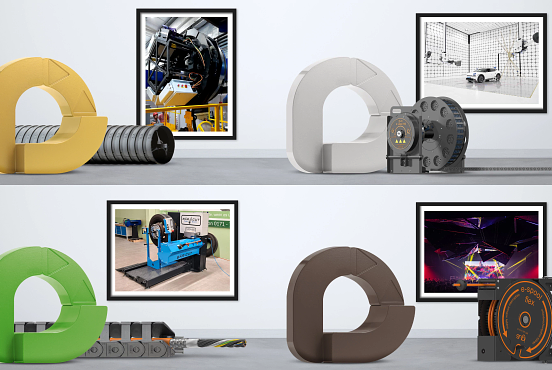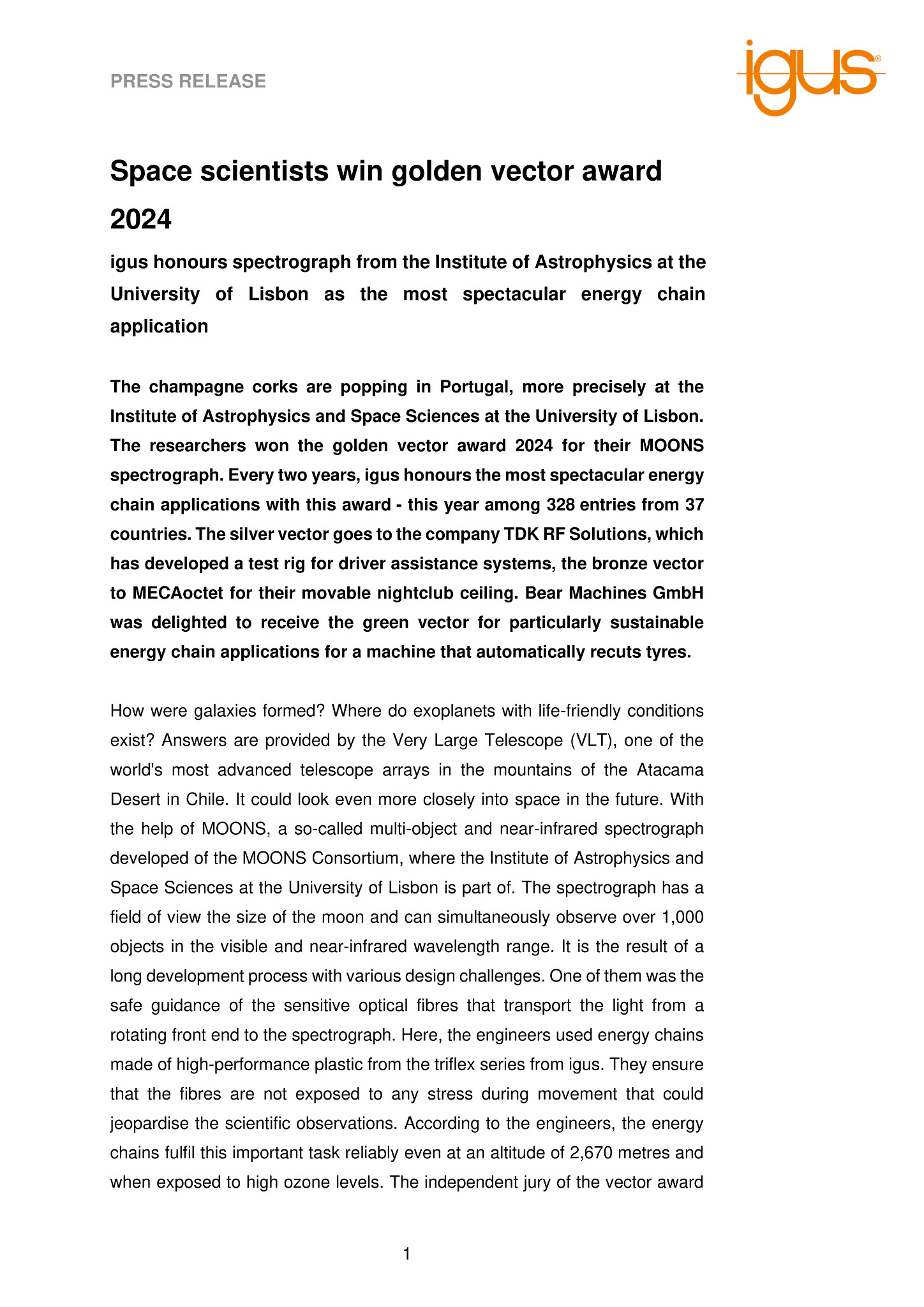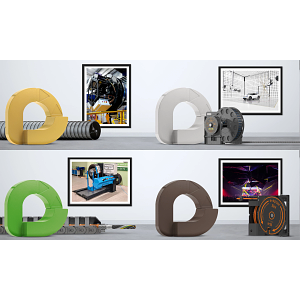Space scientists win golden vector award 2024
April 18, 2024
igus honours spectrograph from the Institute of Astrophysics at the University of Lisbon as the most spectacular energy chain application

The champagne corks are popping in Portugal, more precisely at the Institute of Astrophysics and Space Sciences at the University of Lisbon. The researchers won the golden vector award 2024 for their MOONS spectrograph. Every two years, igus honours the most spectacular energy chain applications with this award – this year among 328 entries from 37 countries. The silver vector goes to the company TDK RF Solutions, which has developed a test rig for driver assistance systems, the bronze vector to MECAoctet for their movable nightclub ceiling. Bear Machines GmbH was delighted to receive the green vector for particularly sustainable energy chain applications for a machine that automatically recuts tyres.
How were galaxies formed? Where do exoplanets with life-friendly conditions exist? Answers are provided by the Very Large Telescope (VLT), one of the world’s most advanced telescope arrays in the mountains of the Atacama Desert in Chile. It could look even more closely into space in the future. With the help of MOONS, a so-called multi-object and near-infrared spectrograph developed of the MOONS Consortium, where the Institute of Astrophysics and
Space Sciences at the University of Lisbon is part of. The spectrograph has a field of view the size of the moon and can simultaneously observe over 1,000 objects in the visible and near-infrared wavelength range. It is the result of a long development process with various design challenges. One of them was the safe guidance of the sensitive optical fibres that transport the light from a rotating front end to the spectrograph. Here, the engineers used energy chains made of high-performance plastic from the triflex series from igus. They ensure that the fibres are not exposed to any stress during movement that could jeopardise the scientific observations. According to the engineers, the energy chains fulfil this important task reliably even at an altitude of 2,670 metres and when exposed to high ozone levels. The independent jury of the vector award 2024 is therefore convinced that the spectrograph from Portugal is the most spectacular energy chain application of the last two years. The Institute of Astrophysics and Space Sciences at the University of Lisbon therefore receives the golden vector award 2024 and prize money of €5,000.
Silver vector goes to US company TDK RF Solutions
TDK RF Solutions does not dedicate its engineering skills to gazing into the stars, but to vehicles with driver assistance systems. To test their electromagnetic compatibility (EMC), the US company is developing a test rig for vehicle-in-the-loop (VIL) tests. To enable the vehicle to drive as if it were on a road, the designers have realised a turntable with rollers. It is surrounded by a series of test antennas that radiate the vehicle with high electric field strengths. Five axes of movement allow each antenna assembly to be positioned freely. To guide control cables and compressed-air hoses along these axes, the engineers rely on energy chains from igus’s 1400 series, which they wind into spring cable reels from the e-spool series. Thanks to the elimination of slip rings, the company has been able to significantly reduce maintenance times. A skilful application that convinced the jury. TDK RF Solutions therefore receives the silver vector award and prize money of €2,500.
Bronze vector goes to French company MECAoctet
Hot party nights guaranteed: the French company MECAoctet has realised a movable ceiling for a nightclub in the Accor Arena in Paris. The ceiling consists of a fragmented mirror measuring 16 x 15 metres, which is divided into 32 triangular elements, 16 of which are movable. Each of these triangles has two mirror surfaces, one at the top and one at the bottom, with the edge consisting of an SRU LED strip. In combination with spotlights, this creates a breathtaking light show. The design challenge was to set the triangles in motion and supply the LED strips with power. To achieve this, the engineers relied on three motorised winches at each corner of the triangles. For the power supply, the experts used slip-ring-free spring cable reels from igus’s e-spool series, fitted with hybrid cables and connected to the triangles’ centres of gravity. According to MECAoctet, the igus solution made it possible to avoid complex coils with rotating collectors, which would have been very expensive and unreliable. Compared to a slider system with cable loops, the solution is also more aesthetic. The jury agrees. The bronze vector 2024 and prize money of €1,000 therefore go to MECAoctet.
Green vector goes to Bear Machines GmbH
With the green vector, the jury honours the special commitment to a greener and more sustainable future. This year’s prize goes to Bear Machines GmbH. The Heek-based company has developed a semi-automatic machine called Bear-Cut, which recuts tyres on cars and trucks. This is not only easy on the driver’s wallet, but also on the environment. Studies by Michelin and Continental show: recutting a tyre can save up to 0.5 litres of fuel per 100km. In addition, up to 650kg of climate-damaging CO2 emissions can be avoided per tyre. Extending the service life of tyres leads to potential savings on raw materials in tyre production. During the construction of the machine, Bear Machines faced the challenge of finding bendable and flexible cables for the motors. Conventional cables proved to be inadequate and could not fulfil the necessary requirements. The engineers therefore switched to robust yet flexible cables from igus’s chainflex range, which move in e-chains from the E2 series.
About the ninth vector award
Power cables, data cables and hydraulic hoses are the lifelines of machines, systems and vehicles. Cable guidance is becoming increasingly demanding as it has to meet the challenges of modern applications – be it progressive miniaturisation, the complex motion sequences of highly developed robots with their acrobatic 3D manoeuvres or sensor technology trends such as predictive maintenance. Engineers from all over the world achieve top performance here every day with energy chains made of high-performance plastic from igus. What makes them special: they have been thoroughly tested under real conditions in our own 3,800 square metre laboratory and come with a unique 36-month guarantee, which igus has now extended to four years. The vector award, which will take place for the ninth time in 2024, honours the boldest and most exciting projects with energy chains. The competition is a global joint initiative launched by igus. A jury of experts from research, specialised press and industry guarantees a well-founded evaluation of the applications submitted. 328 applications from 37 countries were submitted for the vector award 2024.
All information about the competition and all entries can be found at http://www.vector-award.eu.



